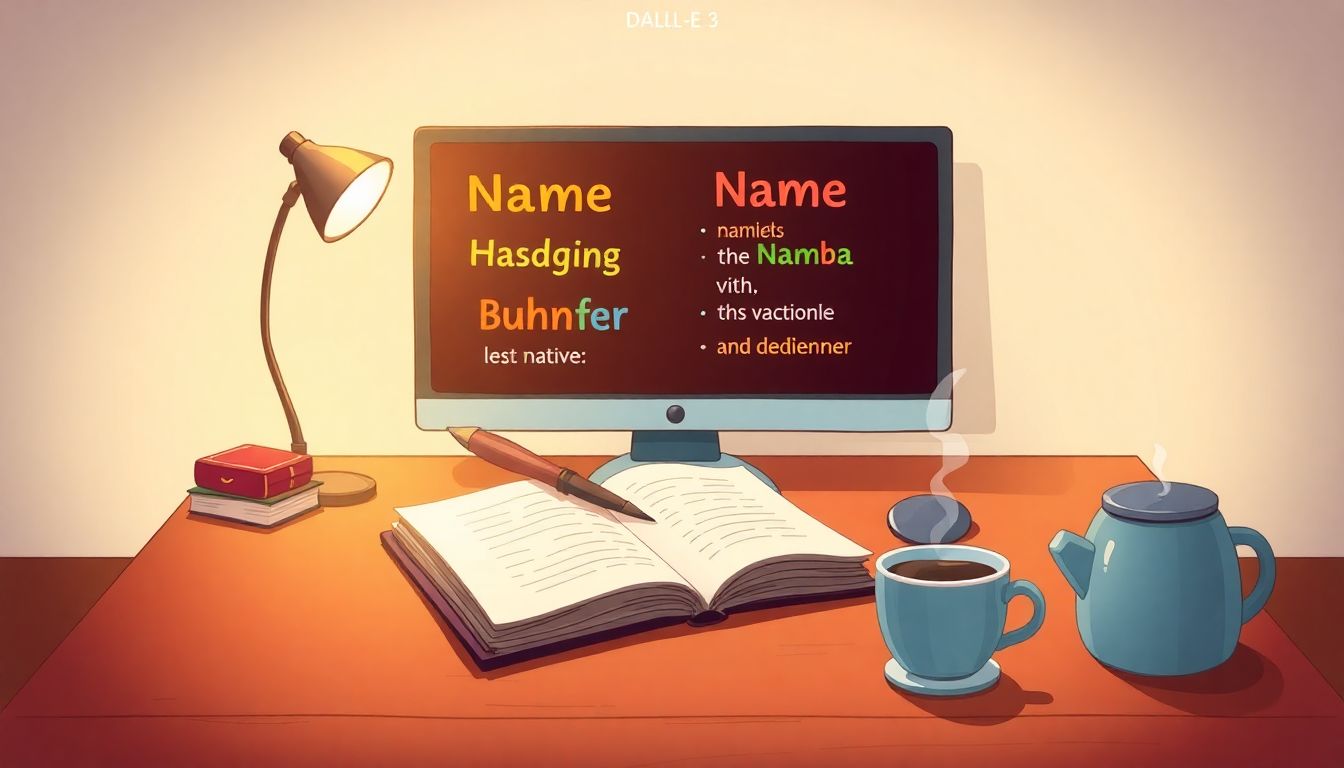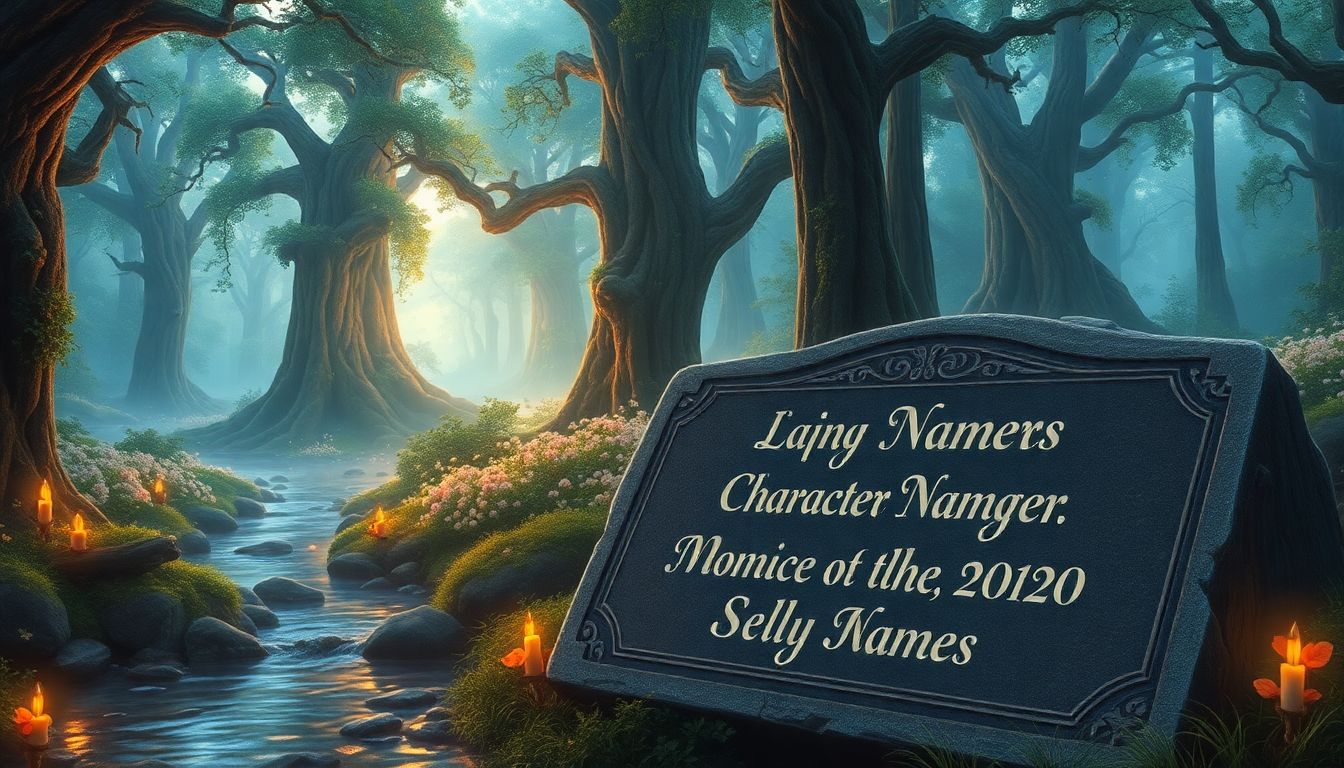Let’s face it, naming characters is tricky business—you don’t want names that feel flat or out of place. We’ve all stared blankly at the blinking cursor, totally stuck trying to nail the perfect name.
But no worries, because this guide will sort that out for you. We’ll point you toward easy, creative online tools that’ll help you find fresh names that fit right into your story.
Ready to name your characters quickly and painlessly? Great, let’s jump in.
Key Takeaways
- Pick a character naming tool based on your genre and setting, especially for fantasy or culturally specific stories.
- Reedsy Name Generator provides realistic, diverse names suited to your story’s location and context.
- Name-Generator.org.uk is great for historically and culturally accurate name suggestions.
- Fantasy Name Generators work well for fantasy and sci-fi, offering plenty of creative options.
- Squibler AI gives personalized names when you input character or story details, helping you find unique matches.
- Choose readable, believable names that suit your genre and avoid characters having overly similar names.

Step 1: Choose the Best Character Naming Tool for Your Needs
If you’re struggling to come up with unique, compelling character names for your story, using dedicated character naming tools can be a big help. But to find the best tool, first consider what you really need. Are you writing a fantasy novel or a crime thriller? Is diversity and cultural authenticity important to your story setting? Think about these points before choosing a tool.
For instance, if you’re writing historical fiction or something culturally specific, you may want a tool that provides authentic-sounding suggestions. On the other hand, if your book is fantasy or science fiction—maybe you’re creating characters in a dystopian world—going for a fantasy name generator might make sense.
One popular approach is to mix and match several tools to broaden your options. This way, you can shortlist a handful of good names and then pick the one that feels most consistent with your character’s personality, background, and role in the story.
Step 2: Use Reedsy Character Name Generator for Diverse Name Ideas
The Reedsy Character Name Generator is a real gem because it offers diverse and authentic-sounding names suitable for multiple genres. How does it work? Simple: choose your genre, indicate if you prefer a male, female, or random name, and click generate.
Let’s say you’re writing contemporary fiction set in India; Reedsy can provide authentic Indian names that help readers connect more deeply with the story. Or if you’re crafting a mystery set in Northern Europe, it can suggest Nordic names that fit the storyline perfectly.
Make sure you spend some time exploring different options on Reedsy to ensure the name you choose not only sounds right but also aligns well with your narrative’s cultural and geographical context.
Step 3: Create Authentic Names with Name-Generator.org.uk
If authenticity matters a lot to your storytelling, then Name-Generator.org.uk is perfect for you. This character naming tool excels by allowing you to generate names specifically by country or ethnic background, ensuring accurate cultural resonance.
Imagine you’re writing a novel based in medieval Scotland. You wouldn’t want to end up with names that sound generic or out of place; instead, you’d use this kind of authentic name generator to suggest realistic medieval Scottish names that immediately lend credibility and depth to your characters.
Here’s a quick tip: When selecting potential names, say them aloud to check their readability and effect. Names may look good on paper but sound clumsy when spoken, and vice versa.

Step 4: Generate Fantasy Character Names Using Fantasy Name Generators
If you’re diving into a fantasy world filled with elves, dwarves, or dragons, regular naming tools just won’t cut it. That’s where Fantasy Name Generators can save your day.
This tool offers dedicated name generators for different fantasy races, cities, and even mystical objects, so you’re practically guaranteed to find names that resonate with your world-building.
Here’s a tip—use the generator multiple times and keep track of names that catch your attention by copying them into a separate document.
After generating a good list, mix and match parts of different names to create something truly original and captivating for your characters.
Step 5: Get Personalized Name Suggestions from Squibler AI Character Name Generator
If you’re tired of scrolling through endless generated names without finding something just right, you should give Squibler’s AI Character Name Generator a shot.
The beauty of Squibler is how it adapts to your preferences—feed it some details about your character or plot, and you’ll get personalized name ideas inspired specifically by your story’s context.
Personalization makes a difference. For example, let’s say your character is a tough pirate queen; you might input keywords like “fearless female pirate captain,” and Squibler delivers suggestions tailormade for such a character.
Pro tip: Use specific, vivid descriptions to get better outcomes from AI suggestions, helping your character names to feel more authentic and rooted within your narrative.
Step 6: Tips for Matching Character Names to Your Genre and Story
Naming your character isn’t just about finding something catchy—you need it to align with your genre and strengthen your story’s authenticity.
Think carefully about period, place, and style. A Victorian girl named Tiffany doesn’t exactly hit the mark, right?
Additionally, consider readability and ease of pronunciation, because you don’t want your readers tripping over complicated names whenever they appear.
Here’s something practical: if you’re writing a children’s adventure, try using engaging and funny character names from these funny writing prompts for kids.
For thriller or horror stories, on the other hand, names that evoke eeriness or dread from resources like these horror plot ideas might work wonders.
Lastly, avoid overly similar names within the same story to minimize reader confusion—give each major character a distinctly different sound and starting alphabet.
Bonus Tip: Exploring the Popularity of AI-powered Tools Like Character.ai
There’s been rapid adoption of AI-driven creative tools lately, and platforms like Character.ai clearly show this trend.
In just a short amount of time, Character.ai reached a whopping 28 million active users by August 2024, as reported by Business of Apps.
The sudden rise in popularity isn’t random—the depth and interactive element of AI-powered naming and storytelling allow people to find character inspiration faster and more organically than traditional methods.
If you’re keen on innovation (without using clichés), experimenting with Character.ai or similar interactive platforms lets you interact directly with characters to feel out different personality-driven naming options naturally.
Just keep in mind that popular doesn’t mean perfect—always mix AI-generated ideas with your personal creativity to land the best name possible for your characters.
FAQs
Think about your genre, character background, and whether you need real-world names or fantasy ones. Pick a generator that meets your specific story needs, offers diverse naming options, or allows customized suggestions based on your characters’ details.
Yes, Reedsy offers diverse options suitable for various cultural backgrounds, time periods, and nationalities. Simply select your preferred language or culture, and it will provide fitting character names aligned with your chosen context and narrative setting.
Fantasy name generators deliver original and imaginative names for characters in fictional worlds. They support diverse genres like sci-fi, medieval, magic-based cultures, and mythical realms, making them ideal tools for writers crafting unique settings and stories.
Consider your character’s role, the genre standards, and the story tone. Historical names suit period fiction, while distinct-sounding names fit fantasy stories. Ensure the character names feel authentic, enhancing readers’ immersion into your specific fictional setting.
